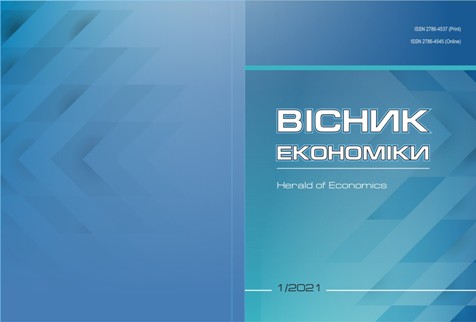Markers of expanding the information infrastructure accounting system in the system of modern business communications
DOI:
https://doi.org/10.35774/visnyk2021.03.125Keywords:
accounting system, information infrastructure, business communications, automated accounting system, cloud technologies.Abstract
Introduction. Modernization of the content of accounting science, which today is under the influence of growing information demands, and, accordingly, modern information systems and information technologies, actualizes the feasibility of developing an accounting paradigm adequate to the new conditions of business communications. These are changes in accounting methodology and practice in the context of the development of both theoretical provisions and practical recommendations for new methods of automation of accounting flows, and, accordingly, the expansion of the information infrastructure, which is constantly updated.
The purpose of the study is to substantiate the need to adapt the accounting system to the conditions of the digital economy and identify key markers of expanding the information infrastructure of modern business communications.
Methods. In the process of studying the new philosophy of views on the development of accounting methodology, which is successfully implemented through the concept of sustainable development, a convergence of national standards to international standards, cloud, the blockchain technology used general scientific techniques, including induction and deduction. Structural-logical and semantic analysis - to clarify and streamline methodological approaches to the choice of model for the formation of information infrastructure in the system of modern business communications; grouping and classification - to justify the benefits of information systems, which are built based on the journal of business transactions of the selected accounting system (program). The information base of the study was the scientific works of domestic and foreign scientists on qualitative changes in the information infrastructure of modern business communications, materials of international scientific and practical conferences, the results of personal experience and observations.
Results. The logical relationship of changes in accounting in the context of the development of both theoretical provisions and practical recommendations for expanding and modernizing its methodology and information infrastructure of modern business communications through digital technologies, which offer new methods of automation of accounting flows. A new philosophy of views on the development of accounting methodology, which is successfully implemented through the concept of sustainable development, a convergence of national standards to international standards, cloud, blockchain - technologies, and therefore identified key markers of expanding information infrastructure, which isconstantly updated.
In the context of choosing a model for the formation of information infrastructure in the business communications system, it is proposed to pay attention to such a defining integrated management tool as a corporate information system, which is considered as a set of information systems of individual divisions. decision-making, in the complex, provide the necessary information support. Most of the information systems, which are built based on the journal of business transactions of the selected accounting system (program), are analyzed. In this regard, the effectiveness of information systems based on the accounting module is described.
Perspectives. Further research should be conducted in the direction of disclosing organizational and methodological tools for the digital transformation of the accounting system, in-depth analysis of internal and external factors of informatization, research of the advantages and disadvantages of existing digital technologies. In this regard, promising research in this context is the development of methodological foundations for the formation of optimal models of information infrastructure in the context of digitalization of the economy and business communications.
References
Kundrya-Vysotska, O. (2020). [Information infrastructure of modern business communications in accounting, VI International scientific-practical conference dedicated to the 20th anniversary of the Department of Audit KNEU “Accounting, analysis, audit and taxation in terms of sustainable development”]. Kyiv: KNEU. P. 425 - 427 [In Ukrainian].
Rozvytok bukhhalterskoho obliku v umovakh hlobalizatsii ta informatyzatsii suspilstva (2017). [Development of accounting in the conditions of globalization and informatization of society]: monograph; О.V. Palchuk, VM Savchenko, IV Ruzmaikina and others; edited by G. M. Davidov. Kropyvnytskyi: PE “Exclusive-System”. P. 26 [In Ukrainian].
Information infrastructure. Wikipedia. Retrieved from: https://uk.wikipedia.org/wiki [In Ukrainian].
Management information systems in accounting and taxation (2020). V. M. Kraevsky, L. V. Titenko, T. M. Payanok, N. V. Paranytsia, S. V. Bogdan. Textbook. Irpen. 294 p. [In Ukrainian].
Ukraine 2030E is a country with a developed digital economy. Retrieved from: https://strategy.uifuture.org/kraina-z-rozvinutoyu-cifrovoyu-ekonomikoyu.html
Pisarevskaya, T. A. (2004). Accounting and auditing information systems: textbook. way. К.: KNEU. 369 p. [In Ukrainian].
Comember I., Palyukh M. (2019). [Accounting in a digital economy]. Institute of Accounting, Control and Analysis in the context of globalization. Issue 1-2, p. 83-96 [In Ukrainian].
Semanyuk, V. Z. (2018). Informatsiyna teoriya obliku v postindustrialnomu suspilstvi [Information Theory of Accounting in Post-Industrial Society: Monograph]. Ternopil : TNEU [In Ukrainian].
Popova, V. D., Kulylyuk, N. M. (2018). Accounting Reporting in the Information Management System of an Enterprise Management Electronic Resource. Retrieved from: http://economyandsociety.in.ua/journal/18_eng/139.pdf [In Ukrainian].
Kundrya-Vysotska, O. P., Lyubenko, A. M., Demko I. I. (2019). [Modern accounting system in the context of its multifunctionality]. Visnyk of the University of Banking. No. 1 (34), pp. 78. Retrieved from: http://dspace.ubs.edu.ua/jspui/handle/1234567 89/1971?mode=full [In Ukrainian].



